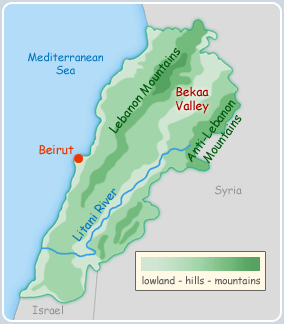Facing climate change and modernization
Lebanon is a relatively resource rich country. It has no deserts, it has good arable land, it has four seasons and it is the most water-gifted country in the Arab world. But despite such natural attributes, Lebanon is a food import dependent country for 70% of its total food consumption. While this in itself is not a problem, as Lebanon only has 350,000 hectares of arable land-an insufficient amount to feed the country’s 4.4 million population- the agriculture sector’s revenues could still be significantly higher.
Approximately one third of the Republic is arable. The most fertile areas are located along the coastal strip and in the Bekaa valley. The Bekka valley is the country´s historical breadbasket and the hub of Lebanese agriculture. It is located between the main mountain chains of Lebanon: on the west, Mount Lebanon and on the east, facing Syria is the Anti- Lebanon (see map). The diversity of the Republic’s topography and climate enables cultivation of a wide variety of vegetables, fruits, industrial crops and cereals.
Syria is the Anti- Lebanon (see map). The diversity of the Republic’s topography and climate enables cultivation of a wide variety of vegetables, fruits, industrial crops and cereals.
In spite of this agricultural capacity, Lebanon´s economy
relies mainly on the banking and financial sectors, and in the tourism industry. According to the CIA, agriculture represents 5.1% of total GDP. It is not a significant figure because in the recent “reconstruction” years (that started after the civil war ended in 1989) there has been little attention to the sector. The sector receives less than 1 percent of the state budget, and foreign direct investment in the sector was only 1.8 percent of the total. Instead, real estate, tourism and industry are getting the bulk of investment in the country despite agriculture’s importance as a major employer in rural areas. This lack of interest in agriculture is further leading to the increase in rural exodus and the migration to the cities.
As the government starts to realize the importance of the sector, it is also noticing one major difficulty that they will have for its development: climate change. In 2010, an un-seasonably warm winter and record high temperatures in the summer battered the sector. In the Bekaa valley temperatures reached 45 degrees Celsius. The high weather is also increasing rates of diseases and pests that degrade the cultivations (see a scientific report here). Furthermore, climate change is expected to deplete snow cover in Lebanon by 40 percent by 2040. The reduction in snow cover will impact rivers and lakes, changing natural cycles and consequently the agricultural sector.
After years of neglect, the Ministry of Agriculture has embarked on a strategy to improve the sector, in order to address the climate threats and improve the importance of the sector in Lebanon´s economy. It is mainly looking at how to modernize and industrialize in a large scale the agricultural sector. They are looking for Lebanon´s new green revolution. New seeds are being brought, more resistant to different climate conditions. Agribusiness and large investment are being promoted.
This modernization may be beneficial for some, but dangerous for others. There is no strong program supervision from the part of the government. For example, only salesman are offering the fertilizers and pesticides to the farmers. There is little if no education given to the growers.
The lack of supervision creates a great risk of having negative or unexpected side effects. Indeed, without education and correct supervision of how the chemicals are used, the success of the modernization program is in peril. On the one hand, farmers using chemicals are subject to serious health risks. On the other hand, incorrect use of fertilizers can degrade the land in a faster pace than usual, and further threaten Lebanon´s agricultural sustainability.
Overall, I suspect that there seems to be a lack of interest and little attention to the average individual farmer. This observation becomes even more interesting as you realize that the large part of Lebanon´s farmers are not Lebanese. They are typically either Syrians migrating into the country or poor Bedouins living on a day-to-day basis. Is there less concern for their health and economic conditions because of their non-Lebanese origin? It may just be the case.
Agriculture in Lebanon is important not only to address climate change and improve economic conditions, but also to keep the resource-rich countryside alive to discourage migration to urban areas, which only puts further strain on the country´s already overburdened infrastructure. There is a saying in Arabic: “A satisfied farmer is a virtual prince”. In Lebanon, this will only come true if the work of farmers is supported. If the agribusiness sector of Lebanon grows as the government hopes it will, it will have to also support and directly assist the farmers that live and know the fields.
Julia Naime is a Research Intern at the SISGI Group. Her research areas are Rural development, International economics and Environmental Policies. She is a student at New York University majoring in Economics.


